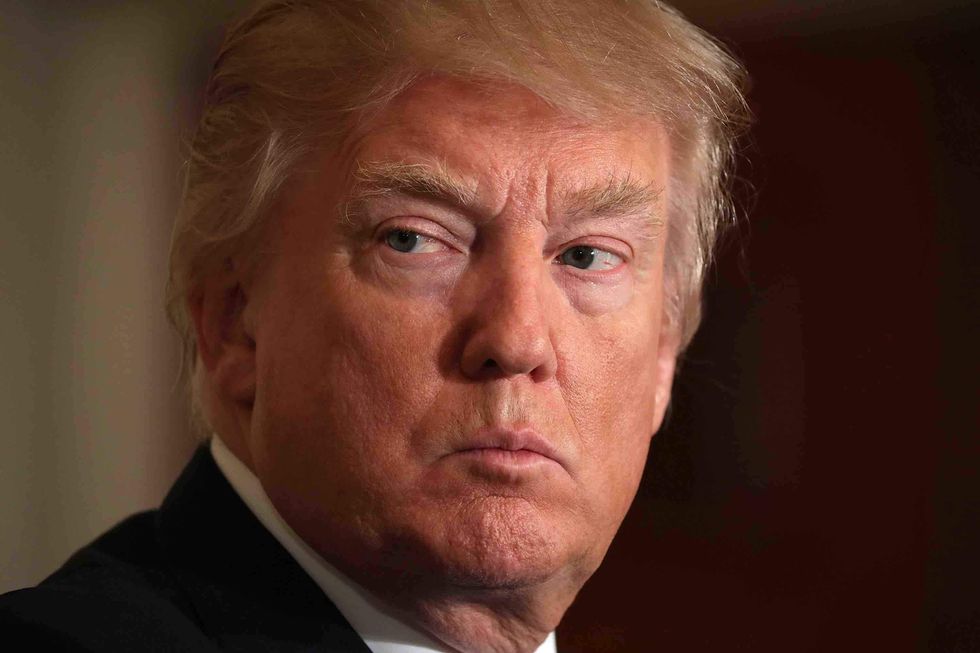
Andrew Stark, professor of political science and public policy at the University of Toronto, reveals a "much more powerful" case against President Donald Trump than obstruction of justice. (Chip Somodevilla/Getty Images)

A whirlwind week in Washington, D.C., wrapped up Friday as President Donald Trump boarded Air Force One for his first overseas trip as leader of the free world. But while most eyes are now on the Middle East and Trump's high stakes visits with heads of state and Pope Francis, multiple lawmakers here are still targeting the president for possible impeachment.
Andrew Stark, a professor of political science and public policy at the University of Toronto, told TheBlaze Saturday, however, that for those alleging Trump obstructed justice by firing FBI Director James Comey, the "more powerful" case against does not involve criminal actions, but possible violations of his constitutional oath of office to "take care that the laws are faithfully executed."
Stark said it is within the president's constitutional authority, as head of the executive branch of the federal government, to fire the FBI director, who was conducting an investigation into the Trump campaign.
"So that raises the further question as to whether this is not a criminal issue, but one that involves him violating his oath of office to take care that the laws are faithfully executed," Stark said.
"That's probably a much more powerful argument against him than obstruction of justice as a criminal matter," Stark continued.
According to the U.S. Constitution, Article II, Section 4: "The president, vice president and all civil officers of the United States, shall be removed from office on impeachment for, and conviction of, treason, bribery, or other high crimes and misdemeanors.”
The Constitution does not state that Congress may impeach the president based solely on the what they may see as his inability to do the job effectively.
The 25th Amendment allows the vice president and a majority of the members of the president's Cabinet to relay any concerns to Congress that the president is “unable to discharge the powers and duties of his office." In this scenario, Congress would then hold a vote.
If two-thirds of members agree with the vice president and the majority of Cabinet officials, the president can then be removed from office.
Stark pointed out that any constitutional violations by the president are Congress' responsibility to deliberate — not a special prosecutor. However, a special prosecutor can provide the critical evidence Congress needs to impeach a president, as was the case with former President Bill Clinton.
Stark further claimed that "we already have evidence" that Trump violated his oath of office.
But, given the fact that Republicans control both the House and Senate, it's unlikely that Congress will take any significant actions anytime soon.
The 2018 midterm elections could be a different story for Trump if Democrats take back control of the House or Senate.
Stark acknowledged this scenario while speaking to TheBlaze: "If the politics shift and Trump loses popularity and Republican congressmen become less and less — want to distance themselves from him — this would be very high on a bill of impeachment or an argument to Trump himself that maybe he should resign."
Democratic Texas Rep. Al Green became the first federal lawmaker last week to call for Trump's impeachment from the floor of the House. He joined Rep. Maxine Waters (D-Calif.) who had already called for the president's impeachment.
The Hill reported last week that as many as 10 more Democrats agreed with Green and Waters that Trump should face impeachment proceedings. Democratic leaders like House Minority Leader Nancy Pelosi and Senate Minority Leader Chuck Schumer were more hesitant to call for impeachment. Pelosi and Schumer instead advocated for the release of more facts before making such a weighted decision.
“I rise today ... to call for the impeachment of the president of the United States of America for obstruction of justice," Green said.
Green based his call for Trump's impeachment on the allegation that the president obstructed justice by firing Comey.
Trump told NBC's Lester Holt earlier this month that he had the "Russia thing" on his mind when he fired Comey. The ousting came as the federal law enforcement agency investigated Trump's presidential campaign for alleged collusion with Russia.
“When I decided to just do it, I said to myself — I said, you know, this Russia thing with Trump and Russia is a made-up story," Trump said.
Comey is scheduled to publicly testify before the Senate Intelligence Committee. In addition to congressional probes, Trump-appointed Deputy Attorney General Rod Rosenstein last week appointed a special counsel to look into the Trump campaign's alleged collusion with Russia.
Meanwhile, even some Republicans said they don't know yet if Trump obstructed justice by firing Comey.
Sen. Marco Rubio (R-Fla.) said Sunday on CNN's "Reliable Sources" that "we don't know yet" if the president broke the law.
And Sen. John McCain (R-Ariz.) likened Trump's "scandals," generally, to the Nixon-Watergate scandal.
"About the only thing I can say is, I think we’ve seen this movie before. I think it’s reaching a point of where it’s of Watergate size and scale and a couple of other scandals that you and I have seen," McCain said May 16 at a forum in Washington, D.C.